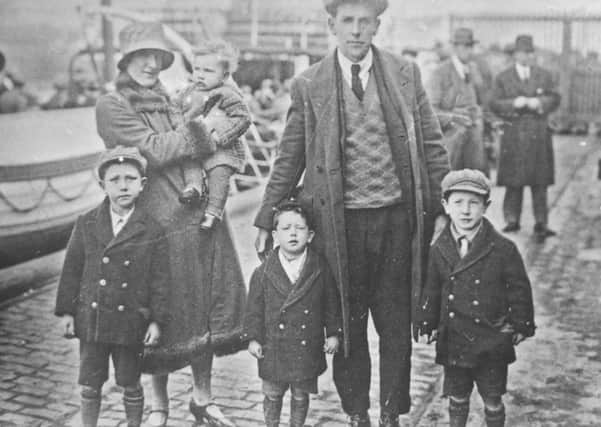Jane McPeck’s voyage from Londonderry to New York


The fruit of his research is the newly-published, ‘The McPeck Journey: An Irish Family from Derry to New York,’ which is a partly fictional work inspired by his forebears’ brave migration into the unknown nearly two centuries ago.
The author, who lives in Nesconset, New York, had little enough to go on, being sure only that his great, great grandfather, Dennis McPeck (possibly McPeak/e originally), was born in Ireland in 1809 and eventually found his way onto the New York City census in 1887, as ‘Denis’ McPeck.
Advertisement
Hide AdAdvertisement
Hide AdHe knew also, that his great, great grandmother Jane McPeck, was born in 1814 or 1815 in Ireland and wound her way onto the US census as ‘Jano.’


She died in New York City in 1879.
Whilst he had plenty of information from his side of the pond he had greater difficulty pinpointing his ancestors’ exact provenance in Ireland.
However, the New York Emigrant Bank records eventually revealed an account for Jane, wife of “Denis McPeak” of Astoria, New York, which suggested she was born in 1814 in Maghara (Maghera).
In Ireland she is believed to have had two children, James and Mary, before emigrating in 1834 on the ‘Patrick Henry’ a transatlantic packet that sailed from Liverpool to New York by way of Londonderry.
Advertisement
Hide AdAdvertisement
Hide AdJohn also found details of a Mary McPeak/McPeck, who was born around 1841 in Killalagh, which is in the right South Londonderry neighbourhood of Maghera.
From this - unavoidably employing a degree of poetic licence to plug the gaps along the way - he’s now published, ‘The McPeck Journey,’ which is currently available to order.
There follows a synopsis and extract from the book itself.
SYNOPSIS
“Story of an Irish family’s struggles from Northern Ireland. Jane McPeck, in her twenties, travelling across the great Atlantic for a new life in New York, leaving her family, never to see them again, also leaving the heartbreak of English workhouses, poor Irish tenant farmers’ rape, and injustice at the hands of English Lords.
“Experiencing the fury of the North Atlantic crossing, both poor English and Irish held together only by their faith and dream of getting to America.
Advertisement
Hide AdAdvertisement
Hide Ad“Come into the powerful Catholic Church and experience its enormous influence, the relationship between Lincoln and Bishop John Hughes, and the Irish of New York.
“Go through birth and death of Irish children, women seemingly always pregnant serving their church’s rise to power, becoming the largest religious denomination in America.
“Feel the sweat of Irish day labourers working for low wages, their disdain for negroes, willing to work for even less.
“Join the Union Army during which the Irish distinguish themselves for Abe, putting them on the American social map, at the same time coping with, and in many case being defeated by, the Irish curse, alcohol.
Advertisement
Hide AdAdvertisement
Hide Ad“Read and understand why an Irish newly-wed would leave her wealthy husband, because of the death promise made to her mother.”
EXTRACT
“1839: Jane McPeck Londonderry (Derry). Londonderry (Derry) eastern sunrise didn’t wake Jane, or her father’s barking sound, get up, get up it’s time to go, Jane already awake and ready, hardly sleeping a wink all night.
“Knowing this would probably be the last time she’d see her family, at twenty-two, Jane, setting sail across a deep and dangerous Atlantic Ocean to a new life in New York, her controlling father sending his daughter, saving her from a shortened life expectancy of impoverished Derry County.
“Thomas Campbell, making provisions for sending his daughter to a distant relative, so distant, probably more of a friend.
Advertisement
Hide AdAdvertisement
Hide Ad“Recommending Jane to an affluent New York family, serving them and their three children, being responsible for keeping house, attending to their children in return, paying her voyage expense, food and shelter, seemingly a good deal for all.
“Mulling over her daily chores, approaching them similar to a great commanding general would, strict but fair.
“Rising early, stoking a fire, preparing morning meals, rousing children from their beds, sending them to school, would be tutored at home after the older children were fed, dressed and on their way to school.
“Next, Jane awakening ‘Madame,’ no need waking her husband, he rose early, and already at work.
Advertisement
Hide AdAdvertisement
Hide Ad“Planning how she’d lay out Madame’s clothes, drawing her bath, discussing her day’s agenda.
“Her husband, partner with a prestigious law firm, both working long hours, mostly supporting charities benefitting his business clients, but charity never the less, both attending meetings and fundraisers, he at night, she during the day, and when needed, with him at night.
“Washing, mending, light cooking, but most importantly, caring for Bartlet’s youngest child, after dinner and before bedtime, clothing needing repair, making sure both children did their homework, her responsibility, finally her day ending, slumber hers.
“Speaking English, acquiring it listening to her mother and father, besides Jane’s Sunday school lessons, and hearing never-ending stories of her Irish heritage, her stonemason father paying a little extra guaranteeing attendance at Sunday school, wanting his daughter educated, best he could.
Advertisement
Hide AdAdvertisement
Hide Ad“Mr Campbell’s working for his Irish neighbours and local English Lords, after all, he’d have to make a living, and no-one seemed to resent him for it.
“Most of his work intended for members of the English aristocracy’s estates with an occasional Protestant Church needing stone facades repaired, his work unsurpassed.
“Jane, closing her eyes, remembering good times, family friends and a few childhood girls she’d played dolls with, her parents’ white washed cottage.”
You can order the Ulster-Irish, Irish-American, Scots-Irish odysseyhere.